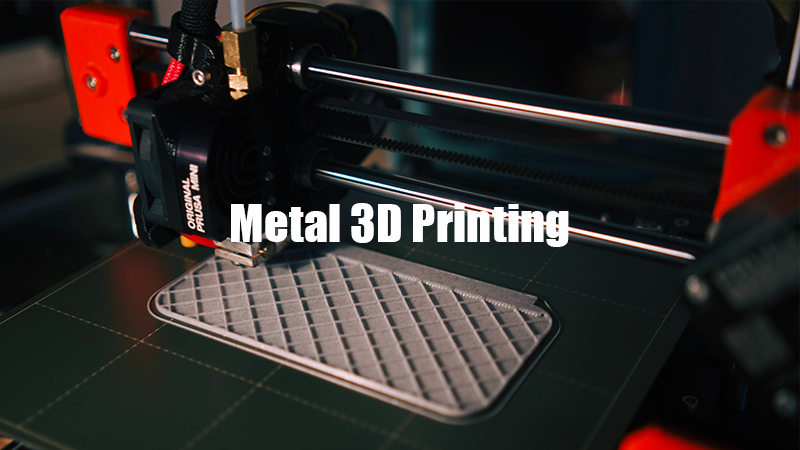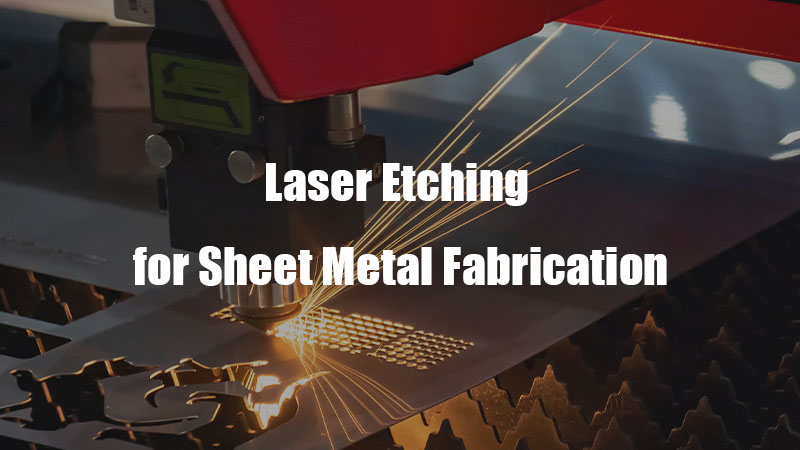Electrical enclosure materials are available in varying grades and standards.
Choosing the right electrical enclosure materials ensure durability, safety against heat, water, and other factors. Material selection impacts usage significantly.
Let’s look at some common materials for your electrical enclosures that can guarantee optimal performance and protection:
Types of Electrical Enclosure Materials
There are various types of electrical enclosure materials for different usage purposes.
Each material offers varying resistance levels against water, high temperature, and other factors. Therefore, you should be careful before choosing any enclosure material.
1. Aluminum Electrical Enclosures
The Aluminum enclosures show great resistance against corrosion and are way lighter than steel enclosures.
Additionally, they are less durable but more susceptible to impact damage than steel enclosures. KDM Fabrication offers the highest quality aluminum electrical enclosures designed for durability, reliability, and complete electrical protection.
Also, aluminum electrical enclosures are naturally powerful against radiofrequency interference (RFI) and electromagnetic fields. This makes them the best choice for electrical enclosures, which need electromagnetic interference shielding around the system.
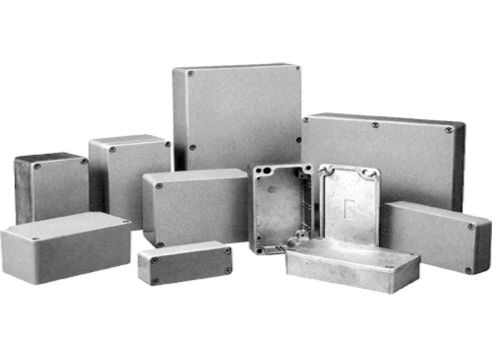
2. ABS Plastic Electrical Enclosures
Secondly, we have ABS plastic, which is the perfect solution for weight-sensitive usage because it does not weigh so much. However, it’s less effective in terms of durability and is not as long-lasting as polycarbonate enclosures.
However, ABS is perfect for electronics and indoor enclosures because of its low cost and easy production. It is very popular in potting boxes, and you can easily find it in key fobs and electrical wall plugs.
Meanwhile, ABS enclosures lack IP or NEMA designations, so you cannot use them in hazardous locations.
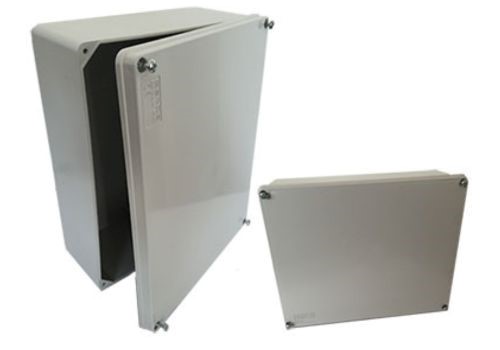
3. Fiberglass Enclosures
Fiberglass enclosures are the most durable and most resistant to chemicals and heat. Usually, they are much more expensive than PVC plastic enclosures.
However, fiberglass electrical enclosures are the best choice when dealing with wear and tear. They can easily handlehigh temperatures as well.
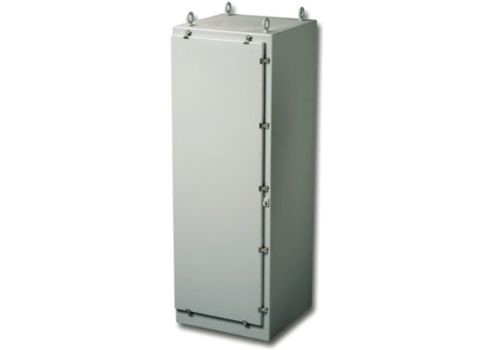
4. Polycarbonate Electrical Enclosures
The polycarbonate electrical enclosure material is no doubt one of the strongest and long-lasting materials. It is highly effective against many factors like corrosion, heat, and other factors, and it is best for both indoor and outdoor enclosures.
It becomes more ideal when you realize its aesthetics because it looks good and has a flexible enclosure material. It is commonly used in industries but still not recommended for large-scale companies with low margins. Also, it lacks electromagnetic shielding, which is important to protect enclosures.
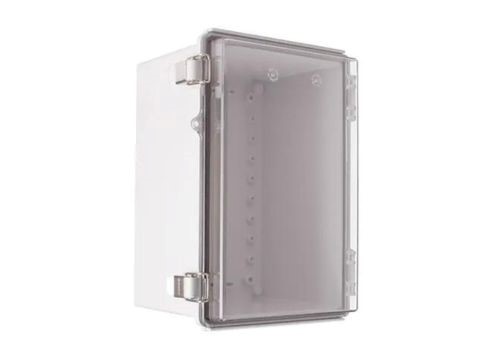
5. Stainless Steel Electrical Enclosure
Next, we have stainless steel, which sounds like Superman but is too expensive, even more than carbon steel.
These enclosures provide superior resistance to corrosion and chemicals. Even in areas exposed to chemicals and seawater, stainless steel enclosure offer perfect solution.
Furthermore, stainless steel electrical enclosures are beautifully polished and uncluttered. This makes them ideal for aesthetics. It still looks great no matter where you want to place these enclosures, such as food processing, workplaces, plants, and medical facilities.
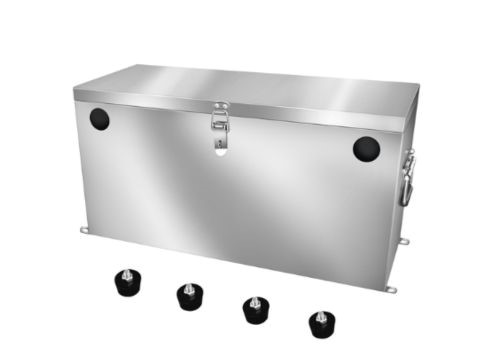
6. Galvanized Steel Electrical Enclosures
Galvanized steel enclosures are corrosion-resistant. They are an excellent choice for outdoor applications or situations where chemicals are present in the enclosure.
However, stainless steel is more rigid and resilient than galvanized steel despite the latter’s superior corrosion protection. Additionally, galvanized steel electrical boxes cost more than carbon steel enclosures.
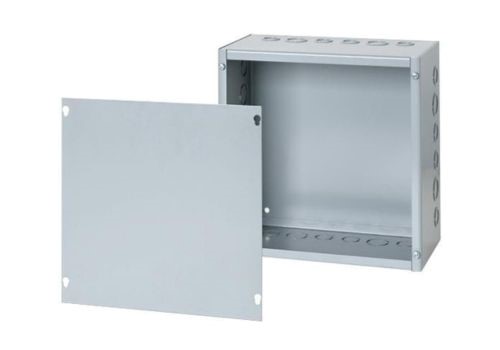
7. Carbon Electrical Enclosures
Carbon Steel enclosures are solid but sturdy materials that can easily handle harsh environments and high temperatures. But the sad part is they are more costly than most other enclosure materials.
Despite it working best against heat, there are better materials that can perfectly handle outdoor situations and still don’t cost this much. Also, you need to provide a coating to make it corrosion-resistant.
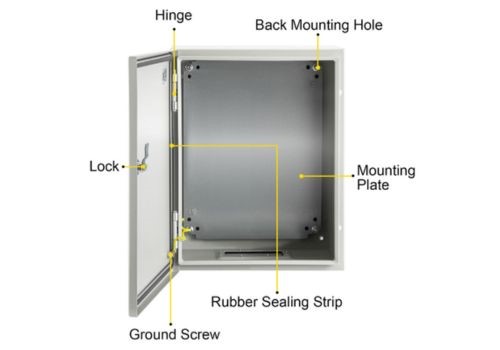
8. PVC (Polyvinyl chloride) Electrical Enclosure
PVC enclosures are usually very light in weight, low cost, and well-suited for discrete indoor electrical applications where weight and cost are important. Meanwhile, PVC works best indoors because it’s not very good for different weather conditions.
An adequate protection from environmental factors can be guaranteed, even if not a level of durability and resilience than metal enclosures, making them more suitable for less demanding indoor applications where the important factors are cost and weight.
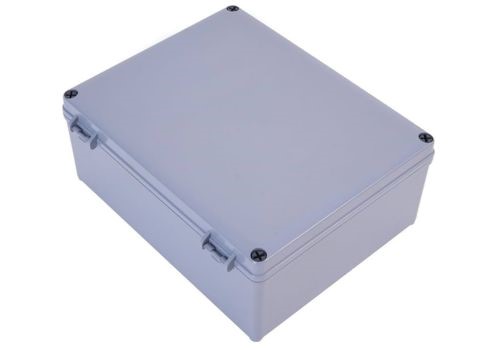
Electrical Enclosure Materials Features and Drawbacks Comparison
| Material | Features | Drawbacks |
| Stainless Steel | High durability, corrosion resistance, aesthetic | Expensive, difficult to machine, dent-prone |
| Carbon Steel | Durable, affordable, paintable | Prone to rust (unless coated) |
| Aluminum | Lightweight, corrosion resistant, RF shielding | Dents easily, not ideal for outdoor use |
| Polycarbonate | Durable, versatile, and good for outdoor use | More expensive than ABS, no RF shielding |
| ABS | Affordable, lightweight, easy to modify | Not ideal for outdoor use, low durability |
| Fiberglass | Strong, impact-resistant, chemical resistant | Expensive, heavy |
| PVC | Lightweight, low cost | Low durability, not ideal for outdoor use |
| Galvanized Steel | Corrosion-resistant, affordable | Less durable than stainless steel |
How to Choose the Perfect Electrical Enclosure Material?
Choosing the perfect material for your electrical enclosure needs more consideration than aesthetics or cost. It is very important as it can impact the whole system if you are using your enclosures in server rooms or anywhere else. So, before selecting any material, you should do this:
- Firstly, decide where you will use the enclosure, indoors or outdoors.
- Measure the enclosure’s dimensions and weight.
- Know what you need, impact, chemical, or water resistance?
- Set your budget for the enclosure.
- Consider the importance of the enclosure’s appearance.
Final Thoughts
Choosing the right material for electrical enclosure is critical. It determines the safety, quality standard rating, and durability of your electrical enclosure.
Usually, it is advisable to work with an expert who can recommend a perfect electrical enclosure material for your applications. Contact us now for free consultations.
More resources:
Electrical Enclosure Safety – Source: KDM
Electrical Enclosure Manufacturing Process in 7 Steps – Source: KDM
How to Remove Powder Coat on Electrical Enclosure – Source: KDM



